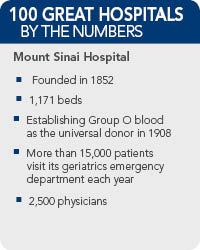Mount Sinai Hospital (New York City). Mount Sinai Hospital is an internationally-acclaimed facility, recognized for its advancements in research, education and patient care. The hospital was founded in 1852 and has since then grown to a 1,171-bed facility employing 2,500 physicians.
 Mount Sinai is affiliated with the Icahn School of Medicine, which was founded in 1968 and a major recipient of funding from the National Institutes of Health, garnering an estimated $215 million in 2013. The hospital, Magnet-designated for nursing excellence, is one of the largest in the United Stats. It is nationally ranked by U.S. News & World Report for eight of the 16 analyzed specialties in 2013-14, three of which are top 10: geriatrics (4), gastroenterology (9) and otolaryngology (10).
Mount Sinai is affiliated with the Icahn School of Medicine, which was founded in 1968 and a major recipient of funding from the National Institutes of Health, garnering an estimated $215 million in 2013. The hospital, Magnet-designated for nursing excellence, is one of the largest in the United Stats. It is nationally ranked by U.S. News & World Report for eight of the 16 analyzed specialties in 2013-14, three of which are top 10: geriatrics (4), gastroenterology (9) and otolaryngology (10).
Aside from its large hospital infrastructure, Mount Sinai works to ensure patients are cared for elsewhere in the community. It is affiliated with the Mount Sinai Visiting Doctors Program, the largest academic house-call program in the nation, which brings medical care to the homes of people with complex and serious illness. The hospital is a Medicare Shared Savings Program accountable care organization, which covers 26,000 Medicare beneficiaries.
Given its lengthy history, Mount Sinai is home to a number of "firsts" in healthcare, including the first successful mastoidectomy in the country (1892), establishing the concept of Group O blood as the universal donor (1908), developing endotracheal anesthesia (1910), publishing the first textbook in the U.S. on pediatric urology (1925), mapping the influenza genome (1977) and discovering how a gene mutation leads to Parkinson's disease (2012), just to name a few. The hospital also established the New York region's first geriatrics emergency department. Each year, more than 15,000 geriatric patients seek emergency care at Mount Sinai.

 |
 |


